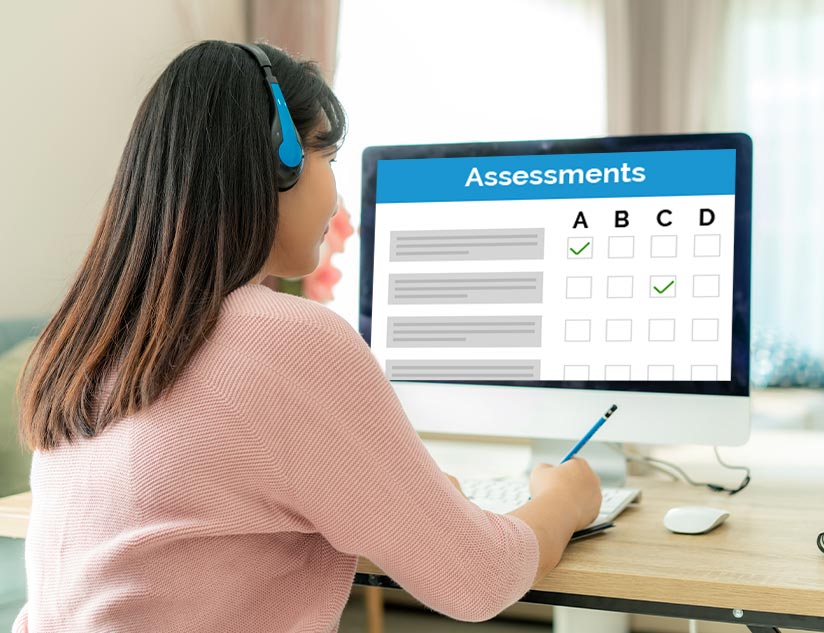For a long time, the purpose of assessments was to test knowledge of the school curriculum, administered to determine whether students’ understanding and learning were completely in accordance with the curriculum. Tests and Assessments in K-12 education have traditionally been designed to track student progress, provide feedback to teachers, and advance curricular improvements. Assessments were also utilized to assess and compare the overall performance of institutions. The larger objective of assessments has always been to strengthen the link between learning and evaluation, enabling a continuous learning and improvement process for both students and teachers.
Over the years, stakeholders – teachers, educational institutions, authorities, and parents – have had various expectations from education. Today, the expectation is to prepare students for the future by focusing on real-world skills that would be relevant in an organizational setup instead of theoretical knowledge traditionally imparted by schools and universities.
This expectation has led to schools and colleges re-evaluating not just what students are learning, but also how they’re learning it. From just acquiring knowledge and reproducing it on paper, students need to be taught how to effectively gain skills and knowledge through learning, with the role of assessments shifting to measure this new method of understanding. This transformation requires a re-examination of the current assessment systems, compelling us to ask the question – are traditional assessments an authentic proof of educational outcomes?
K-12 Assessments – Changing in format
Too much of standardized testing in schools and universities is leading to an apparent dissatisfaction with the system. While schools only focus on assessing end-session outcomes, assessing learner progression is crucial as well. To assure learner progression, employing digital learning tools that focus on a more qualitative rather than quantitative approach has become imperative. However, it has been noted that each student has a different level of understanding of concepts; so, how do we design assessments to determine whether the student is on the same page as the teacher?
We need to make assessments that are an effective test of knowledge and proof of actual understanding of a concept. Unlike traditional tests that focused on the question-and-answer format, we are now seeing a shift towards a next-generation form of assessments that track reasoning and student understanding through meta-analysis from different data sources. For instance, teachers today are using effective assessment tools like quizzes, polls and gamified exercises that encourage learners to apply their minds and think beyond textbook concepts. EdTech assessment platforms and tools have helped enable an evolution in the assessment process.
We are seeing a change in the nature of assessments from:
- Subjective to Objective: Subjective assessments leave ample scope for individual interpretation, making a class-wide comparison often difficult. Objective assessments, on the other hand, can test students on both memory and synthesis and are easier to administer, especially on e-Learning platforms like MagicBoxTM.
- One Time to On-Going: Traditional assessments, to a large extent, are focused on end-of-program learning. Digital assessments are changing this by measuring student learning throughout the program, administering tests in the middle of the course, not just towards the end. This helps educators map learning progression on a spectrum.
- Theory-Based to Project/Activity-Based: While theory-based assessments test students for memory and theoretical knowledge, project-based assessments employ holistic parameters to test understanding and real-world application. For instance, a group activity involving a simulated marketplace will be more effective in teaching students basic demand and supply concepts instead of merely reading about it.
We have also seen more assessments incorporating game-based learning, allowing students to think beyond traditional systems and formats of learning.
What is the future of K-12 Assessments?
The truth is, no single assessment is equipped to evaluate the different kinds of learnings we value in students. What is needed is a coordinated system of assessments using a variety of tools to achieve different objectives. Specifically, there will be more:
- Interdependence: Teaching and assessment will become interdependent. For instance, e-Learning modules will enable teachers not just to impart information, but also assess individual learning progress. A powerful learning environment directs the attention of the teachers to the skills and attitudes of individual learners. Such a learner-centric approach will bring out multiple perspectives in classroom environments and assessments.
- Focus on Method: Assessments will focus not only on what students have learned but how they learned it. Teachers will need to place emphasis on building a strong foundation on academic concepts to help students develop competence in a subject. Teachers must then cover some subject matter in depth, illustrating concepts through real-world examples, to ensure students get a strong foundation of factual knowledge.
- Game-Based Assessments: The evolution of technology will enable educators to create a more engaging and interactive learning environment. Games engage learners to provide learning experiences while simultaneously assessing the student. A rise in digital simulations and game-based assessments will support formative assessment practices, leading to more balanced and nuanced student learning outcomes.
- Adaptive Assessments: Traditional assessments work well for the majority of students who are at a level similar to what the assessment seeks to evaluate. But, students at the farther ends of the spectrum—high-achievers and struggling learners—are unable to achieve the desired results of a standardized test. This makes it difficult for teachers to identify what concepts and modules those students are struggling with. A teacher sometimes struggles to find gaps in students’ learning because traditional assessments aren’t equipped to answer those questions. Personalized learning, on the other hand, leads to adaptive testing for students, which allows teachers to determine individual student’s gaps and try to fix problem areas. Adaptive tests will thus be more prevalent owing to their ability to evaluate students at their own levels instead of a standardized one.
- Stress on Metacognition: Metacognition is gaining importance as educators realize its power to complement existing assessment tools. Assessments will thus evolve to test more than just theoretical knowledge; they will focus on testing metacognitive skills. Teachers will need to employ a meta-cognitive instruction approach to enable students to take control of their own learning by defining their goals and subsequently monitoring their own progress. Meta-cognitive skills will need to be integrated into the school curriculum in diverse subject areas.
- Stress on Critical Thinking: Assessments will involve critical thinking, reasoning, and logic as a core part of assessments. They will focus on higher-order cognitive skills that allow students to apply their learning to new situations rather than those that involve rote learning and using basic procedures. Assessments will move towards more complex critical thinking while performing tasks as project-based e-Learning will expand. Sophisticated assessment methods will evaluate critical thinking performance through digital media, games, and simulation-based data.
- Standards-Based Assessments: Standards-based assessments will take center-stage, owing to their ability to formulate effective assessment standards. They ensure that students are equipped with practical skills for successful careers with deeper knowledge, critical thinking ability, reasoning skills, and interpersonal skills. For instance, Next Generation Science Standards (NGSS) are already being implemented in the field of STEM education to enable critical learning outcomes.
Challenges and Opportunities That Arise with Evolving K-12 Assessments
Despite having identified the various methods of assessments, a few key challenges still remain in bringing these evaluations to light:
- Integration: Integrating the above-mentioned factors into a coherent form of assessment is one of the major challenges. Organizing the disconnected pieces of educational assessment into a more coordinated system will remain a task for educators and other stakeholders worldwide. Doing so will require a comprehensive multi-purpose, multi-use design model.
- Design: Designing tools and tasks that can successfully be implemented in newer forms of assessments is the second challenge. For instance, e-Learning platforms may take a different but effective approach to assessments without having a user-friendly seamless design in place. This could undermine the very purpose of having a new-age, evolved style of assessment. Developing appropriate analytics tools for the task still remains difficult. Current techniques used for scoring of assessment tasks are also largely insufficient for revealing precise analytics to policymakers.
- Resistance: Resistance from multiple stakeholders on implementing new assessments models can also impede progress. Teachers, parents, and policy makers may not immediately see the benefits of adopting adaptive, game-based assessment tools and may prematurely dismiss them as being ineffective. Having a dialogue with multiple stakeholders about the need for a shift in assessment policy will need to be carried out inclusively and sensitively.
- Quality: Creation of high-quality assessments that are reusable and cost-effective at the same time is another significant challenge. Educators and policymakers will need to shift the focus of assessments more on the level of the learner and the teacher, making them the primary benefactors of the information extracted from more effective assessments. We will also need to make the shift from the current process of disposable tests to designing high-quality, reusable assessments.
In transforming assessment systems to maximize learner and teacher success, it will become essential to align teaching practices, learning goals and standards, teacher training and development, and the use of the most appropriate teaching methodologies.
Educational reform often sees educators and administrators struggling to keep up with conflicting demands as the burden of organizing course structure, instruction, and assessment rests on their shoulders. As we learn more about the cognitive nature of learning, shaped by backgrounds and cultural perspectives, we see assessments taking on a different color. We now see teachers warming up to the fact that learning doesn’t happen in silos and instead has multiple purposes to serve. Teachers are now expected to not just keep up with the demands of the school curriculum, but also to the needs of individual learners with different backgrounds and understandings. Thus, a dynamic set of assessment ideas is required, powered by technology, for more adaptive and inclusive assessments.















